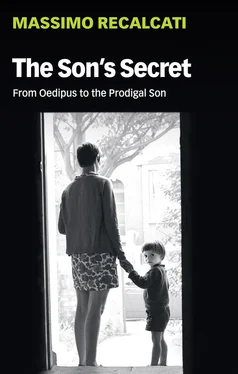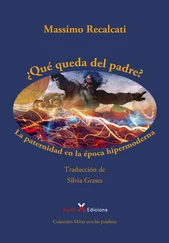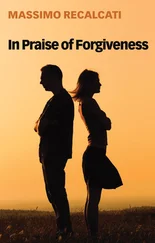The enigma of the son is what disturbs Oedipus’ father, Laius, to such a degree (as he is warned by the oracle that his son is destined to murder him and possess his wife) that he takes the terrible decision to kill him. In the myth of Oedipus, Laius reacts to his destiny of death by his son’s hand by demanding the death of his son. He is not able to see his son as the mystery, at once threatening and radiant, fertile, that each child is for their parents. Should the son’s life not surpass that of those who have created him – should the child’s life not sanction their death, their inevitable decline? 2When she predicts Oedipus’ destiny, is the oracle not revealing an inevitable and unavoidable truth about the relationship between fathers and their sons? Is the ‘threatening’ nature of every son – like that of a student for their master – not that which inevitably imposes the death of their own origins, of their own parents? Does a child coming into the world not remind their creators of their own mortal destiny? Does the child’s life not perhaps always signal the limitlessness of life and, as a consequence (as Hegel carefully pointed out), the arrival of the end as revealed to their parents? 3
This book is inspired by a re-reading of the events narrated by Sophocles in Oedipus the King and in Luke’s parable of the prodigal son, which both take as their premise the interwoven destinies of fathers and sons. Does the father’s guilt always fall on the son? Does an absence of desire in the parents necessarily condemn the child, relentlessly excluding them from any access to desire? And what Law is passed on from one generation to the next? The Law of destiny that seals the fate of the child’s life as a guilt-ridden repetition of that of the parent? Or another form of the Law, which invites us to suspend that Law’s inflexibility?
Oedipus and the prodigal son demonstrate the oscillation between these two poles in the process of filiation. Oedipus the son is trapped in a symmetrical conflict with his father, with no hope of resolution. Infanticide and patricide mirror one another. The father of the prodigal son shows instead that he knows how to bear the real that cannot be shared, embodied by the life of his son. He does not respond to his son’s ‘patricidal’ gesture with hate, but chooses to trust him, to not stand in his way. He shows that, unlike Laius, he does not fear his son’s absolute secret but loves it deeply. In his father’s gesture of forgiveness, the warm welcome he extends upon his son’s return, the prodigal son finds a dissymmetry that breaks with any understanding of the Law as an inexorable destiny or punishment, the very thing that crushes Oedipus’ life. This father is able to recognize the enigma of the prodigal son without demanding to solve it. He offers himself as a Law whose foundations do not lie in any Code but only in the act of forgiveness itself, as the highest possible form of the Law, as the freedom of the Law. This is what the son learns for himself: it is not humankind that is made for the Law but the Law that is made for humankind. 4
The son embodies the unsharable difference of life and its limitless strength. He resists any possible empathetic identification. He moves through the world carrying with him not only the irreducible difference of his own generation from that of his parents, but also the most elusive detail of his own existence. The greatest gift given to the son by the father in Luke’s parable is that of freedom, which is the greatest gift any parent can give their child. The father does not demand dialogue or reciprocal comprehension, but recognizes the son’s desire as an indecipherable enigma. Is this indecipherability not constantly experienced by every parent? Does love as an absolute openness to the mystery of the child’s otherness not arise precisely from this? Does respect for the child’s secret not perhaps indicate how being a parent is never an experience of acquisition or appropriation, but of decentralization of the self? Love is not empathetic. It is not based on reciprocal understanding, on sharing, but is respect for the absolute secret of the Other, for their solitude. Love is founded on the distance of difference, on that which cannot be shared, on the real of the Two that cannot be assimilated. This is not only the case for the bond between parents and their children, but even more so in every other relationship. Psychoanalysis allows us to see how those lasting loving relationships capable of being generative are the ones that never dissolve the enigma of the Other, the ones that know how to maintain the Other’s absolute secret that is impossible to comprehend. Only on the basis of this solitude, of this enigma that each person is and must remain for the Other (as well as for themselves) can a relationship with the Other, a being together with the Other, occur.
I watch my children grow, becoming autonomous and increasingly mysterious to me. I believe that this mystery is the mark of a difference that must always be preserved and admired, even when it seems disconcerting. I am always as amazed by their beauty and their splendour as I am by their messiness and laziness. So infinitely different from how I remember my condition as a son, and yet so incomprehensibly the same. I do not demand to know or understand anything about their lives, which rightly escape me, lying beyond my grasp. When walking next to them, in the silence of our close bodies, I sense the sound of their breathing as an inexpressible difference. It is a fact: every child carries an inaccessible secret with them, in their breath. No illusion of empathetic sharing will ever get to the bottom of this strange proximity. The joy between us erupts precisely when that which cannot be shared, the thing that separates us, generates a closeness with no illusion of communion. Our children are out there in the world, exposed to its beauty and its atrocity with no shelter. They are, like all of us, at the mercy of the four winds, despite or thanks to the love that we give them.
I truly know nothing about my children’s lives, but I love them for precisely this reason. I am always at the door waiting for them without ever asking them to return. If we are close, it is not because I understand them, but because I value their secret.
Milan-Noli-Valchiusella, January 2017
This book brings together talks given at three conferences: Bose (2016), the Teatro Parenti in Milan (2016) and the Biblical Festival of Vicenza (2014).
1 1. I address this theme and the relationship between parents and their children in our time in general, in Massimo Recalcati, Che cosa resta del padre? La paternità nell’epoca ipermoderna [What Remains of the Father? Fatherhood in Hypermodern Times], Milan: Raffaella Cortina, 2011, and The Telemachus Complex: Parents and Children after the Decline of the Father, Cambridge: Polity, 2019.
2 2. This is one of the reasons the event of a child’s death is so utterly senseless and traumatic, literally inconceivable, for a parent.
3 3. G. W. F. Hegel, Hegel’s Phenomenology of Spirit, trans. A. V. Miller, Oxford University Press, 1977, pp. 276–7.
4 4. ‘The Sabbath was made for man, not man for the Sabbath’: Mark 2:27.
Part One
Конец ознакомительного фрагмента.
Текст предоставлен ООО «ЛитРес».
Прочитайте эту книгу целиком, на ЛитРес.
Безопасно оплатить книгу можно банковской картой Visa, MasterCard, Maestro, со счета мобильного телефона, с платежного терминала, в салоне МТС или Связной, через PayPal, WebMoney, Яндекс.Деньги, QIWI Кошелек, бонусными картами или другим удобным Вам способом.












